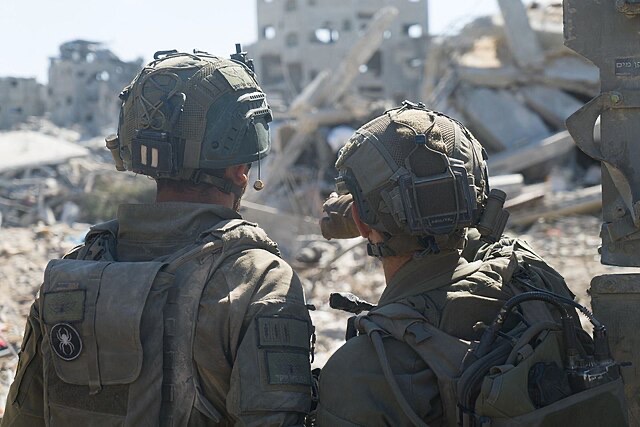At least 20 people have been killed in an incident in Khan Younis, according to the Gaza Humanitarian Foundation (GHF), an Israel and US-backed organisation that has faced mounting criticism over its controversial aid distribution methods in the war-torn enclave.
The GHF said 19 people were trampled and one was stabbed in a surge “driven by agitators in the crowd” at one of its distribution centres in the southern Gaza city on Wednesday. The organisation claimed it had “credible reason to believe that elements within the crowd – armed and affiliated with Hamas – deliberately fomented the unrest.”
The controversial group, which has been rejected by the United Nations and other aid organisations, provided no evidence to support its allegations. The statement marks a rare acknowledgement of trouble at its distribution sites, where hundreds have died since operations began in late May.
“For the first time since operations began, GHF personnel identified multiple firearms in the crowd, one of which was confiscated. An American worker was also threatened with a firearm by a member of the crowd during the incident,” the GHF statement read.
Palestinian health officials told Reuters at least 20 people had died of suffocation at the site, contradicting the GHF’s account of the deaths.
The incident comes as the UN Office of the High Commissioner for Human Rights revealed that 875 Palestinians have been killed near aid sites in recent weeks. According to OHCHR spokesperson Thameen Al-Kheetan, 674 of these deaths occurred in the vicinity of GHF sites, whilst 201 were killed near other aid convoys.
The GHF began distributing food packages in Gaza at the end of May, after Israel eased its 11-week blockade of aid into the territory. The organisation operates four distribution centres, three in southern Gaza Strip, which are guarded by private security contractors and located in zones where the Israeli military operates.
Palestinian witnesses say Israeli forces have repeatedly opened fire towards crowds of people going to receive aid. Multiple witnesses have described coming under fire whilst attempting to reach the distribution centres, with some describing the experience as akin to the dystopian thriller “Squid Game.
The Israeli military says it has fired warning shots at people who have behaved in what it says is a suspicious manner. It says its forces operate near the aid sites to stop supplies from falling into the hands of militants.
Tom Fletcher, the UN’s humanitarian chief, condemned the GHF model at a Security Council meeting, calling it a “cynical sideshow” and “deliberate distraction.” He said the organisation “restricts aid to only one part of Gaza while leaving other dire needs unmet” and “makes starvation a bargaining chip.
After the deaths of hundreds of Palestinians trying to reach the aid hubs, the UN has called the GHF’s aid model “inherently unsafe” and a violation of humanitarian impartiality standards.
In response, a GHF spokesperson said: “The fact is the most deadly attacks on aid sites have been linked to UN convoys.” The GHF says it has delivered more than 70 million meals to Gazans in five weeks and claims other humanitarian groups – which refuse to work with the GHF – had “nearly all of their aid looted” by Hamas or criminal gangs.
The organisation was registered in Delaware, United States, in February 2025 and is currently led by Rev. Dr. Johnnie Moore, an American evangelical leader and former faith adviser to President Donald Trump. Moore took over in early June after the resignation of Jake Wood, who stepped down citing concerns about maintaining humanitarian neutrality.
Palestinian witnesses describe harrowing journeys to reach the aid centres. Mohammed Saqer, a father of three, said tanks were firing over the heads of crowds as drone announcements told everyone to move back. “It’s like it was ‘Squid Game,'” he said, adding that raising your head might mean death.
The GHF’s approach has been fiercely criticised by humanitarian organisations. More than 170 charities and NGOs, including Save the Children, Oxfam and Amnesty International, have demanded the immediate closure of the GHF, accusing it of facilitating attacks on starving Palestinians.
“No aid organization would recommend doing it that way,” said Ciaran Donnelly, senior vice president for international programs at the International Rescue Committee, referring to the GHF’s use of just four mega-sites rather than hundreds of smaller distribution points.
UNRWA, the UN agency for Palestinian refugees, noted it had operated about 400 sites across Gaza, whilst the GHF has set up only four “mega-sites” – three in the south and one in central Gaza, with none in the north where conditions are most severe.
Israeli opposition leader Yair Lapid has suggested that the GHF and the American Safe Reach Solutions are shell companies used to hide Israeli government funding, though Moore told NBC News that to his knowledge the group is not funded by the Israeli government.
The controversy follows reports from Israeli outlet Haaretz that IDF troops had received orders to fire on unarmed crowds to “keep them away from food distribution centers.” American security contractors have also reportedly been firing live ammunition and lobbing stun grenades at Palestinians seeking aid.
Since the Gaza war began following Hamas’s attack on Israel on 7 October 2023, which killed approximately 1,200 people, Israel’s offensive has killed over 57,000 Palestinians, according to the Hamas-run Gaza Health Ministry. The war has displaced nearly all of Gaza’s 2 million people and left many facing starvation.
The GHF maintains that recent violent incidents were unrelated to its aid centres and has accused the UN of pushing “false information” about its operations. However, witnesses continue to report daily violence, with many now referring to the distribution sites as “death traps” rather than aid centres.
Follow for more updates on Britannia Daily
Image Credit:
Swords of Iron military operation (2024) – Image by Israel Defense Forces, licensed under CC BY-SA 3.0, via Wikimedia Commons.
View Image



